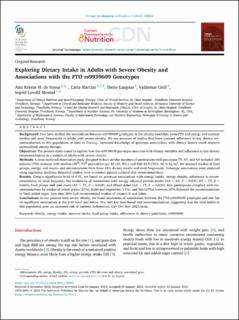| dc.contributor.author | De Soysa, Ann Kristin Hjelle | |
| dc.contributor.author | Alho Letra Martins, Catia Patricia | |
| dc.contributor.author | Langaas, Mette | |
| dc.contributor.author | Grill, Valdemar Erik Robert | |
| dc.contributor.author | Mostad, Ingrid Løvold | |
| dc.date.accessioned | 2023-10-25T11:29:33Z | |
| dc.date.available | 2023-10-25T11:29:33Z | |
| dc.date.created | 2023-02-19T14:37:41Z | |
| dc.date.issued | 2023 | |
| dc.identifier.citation | Current Developments in Nutrition (CDN). 2023, 7 (2), 1-9. | en_US |
| dc.identifier.issn | 2475-2991 | |
| dc.identifier.uri | https://hdl.handle.net/11250/3098669 | |
| dc.description.abstract | Background
Few have studied the associations between rs9939609 genotypes in the obesity candidate locus FTO and energy and nutrient intakes and meal frequencies in adults with severe obesity. We are unaware of studies that have assessed adherence to key dietary recommendations in this population, at least in Norway. Increased knowledge of genotype associations with dietary factors could improve personalized obesity therapy.
Objectives
The present study aimed to explore how the rs9939609 genotypes associate with dietary variables and adherence to key dietary recommendations in a sample of adults with severe obesity.
Methods
A cross-sectional observation study designed to have similar numbers of participants with genotypes TT, AT, and AA included 100 patients (70% women) with median (25th, 75th percentile) age 42 (32, 50) y and BMI 42.8 (39.5, 46.4) kg/m2. We assessed intakes of food groups, energy, and macro- and micronutrients from three 24-h dietary recalls and meal frequencies. Genotype associations were analyzed using regression analyses. Reported intakes were evaluated against national diet recommendations.
Results
Using a significance level of 0.01, we found no genotype associations with energy intake, energy density, adherence to recommendations, or meal frequency but tendencies of associations with energy adjusted protein intake (AA > AT, P = 0.037; AT > TT, P = 0.064), food groups milk and cream (AT > TT, P = 0.029), and Mixed dishes (AA > TT, P = 0.039). Few participants complied with recommendations for intakes of whole grains (21%), fruits and vegetables (11%), and fish (37%); however, 67% followed the recommendation to limit added sugar. Less than 20% had recommended intakes of vitamin D and folate.
Conclusions
In our patients with severe obesity, we found tendencies of associations between the FTO rs9939609 genotypes and diet but no significant associations at the 0.01 level and below. Few met key food-based diet recommendations, suggesting that the food habits in this population pose an increased risk of nutrient deficiencies. Curr Dev Nutr 2023;xx:xx. | en_US |
| dc.language.iso | eng | en_US |
| dc.publisher | Elsevier | en_US |
| dc.rights | Navngivelse 4.0 Internasjonal | * |
| dc.rights.uri | http://creativecommons.org/licenses/by/4.0/deed.no | * |
| dc.title | Exploring Dietary Intake in Adults with Severe Obesity and Associations with the FTO rs9939609 Genotypes | en_US |
| dc.title.alternative | Exploring Dietary Intake in Adults with Severe Obesity and Associations with the FTO rs9939609 Genotypes | en_US |
| dc.type | Peer reviewed | en_US |
| dc.type | Journal article | en_US |
| dc.description.version | publishedVersion | en_US |
| dc.source.pagenumber | 1-9 | en_US |
| dc.source.volume | 7 | en_US |
| dc.source.journal | Current Developments in Nutrition (CDN) | en_US |
| dc.source.issue | 2 | en_US |
| dc.identifier.doi | 10.1016/j.cdnut.2023.100032 | |
| dc.identifier.cristin | 2127293 | |
| cristin.ispublished | true | |
| cristin.fulltext | original | |
| cristin.qualitycode | 1 | |

